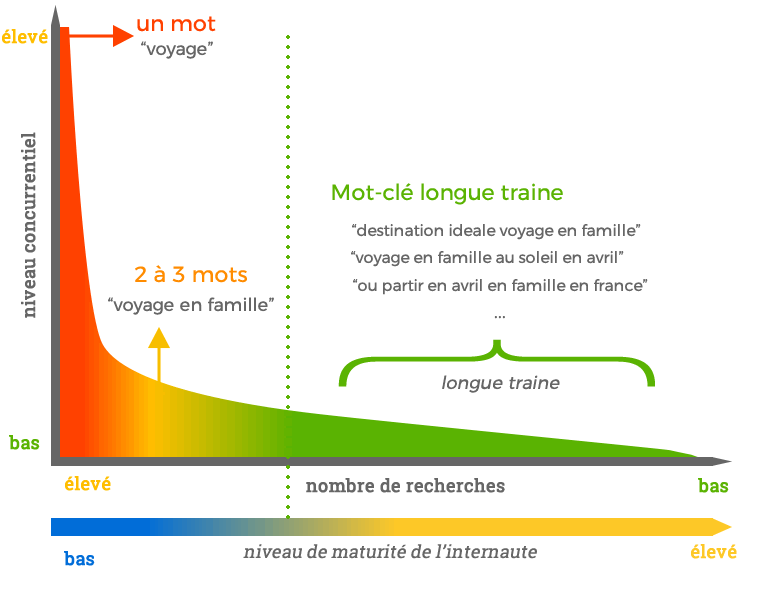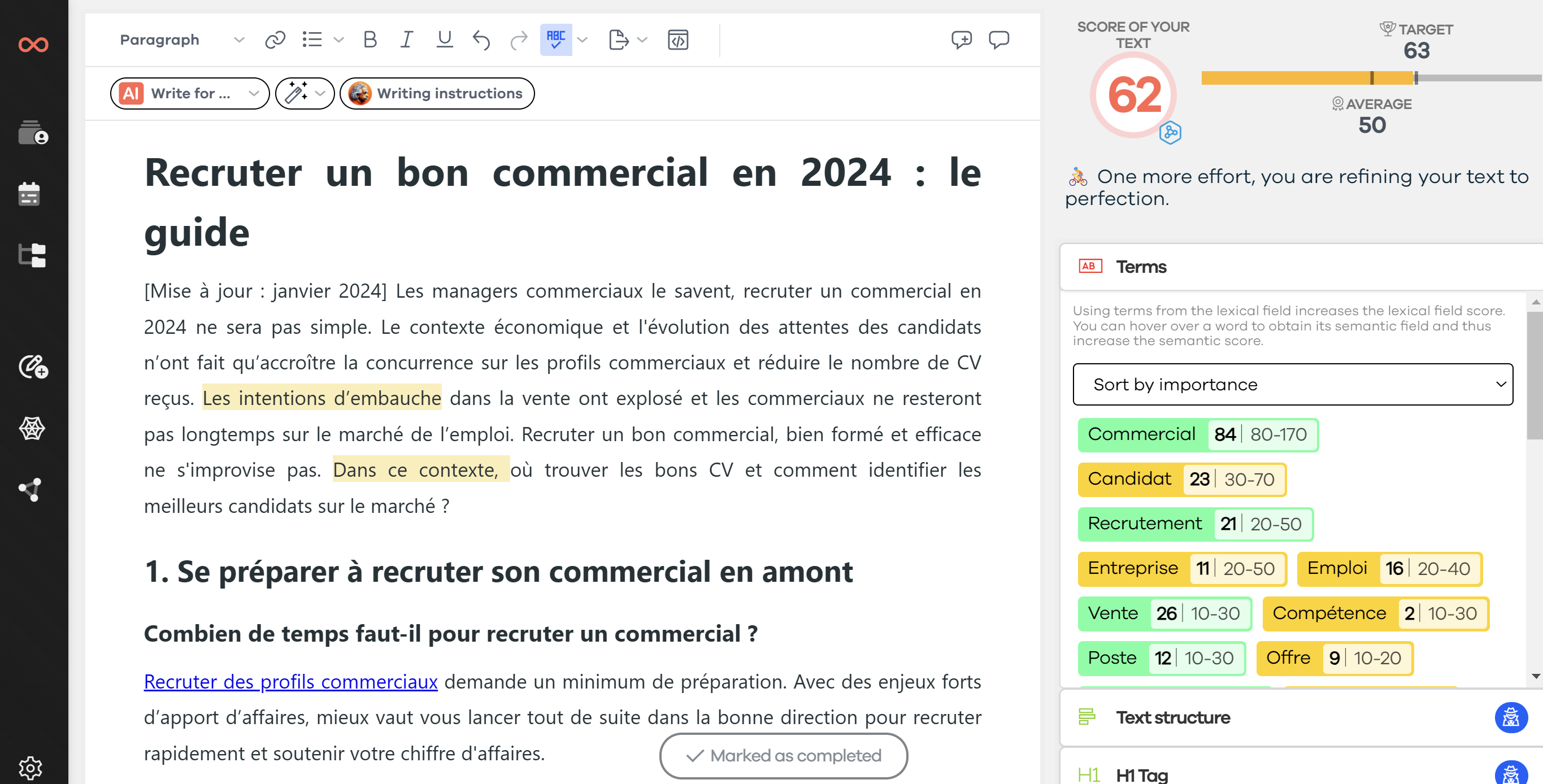Choosing your keywords is a determining factor for the success of an organic SEO strategy. Before choosing your keywords, it's important to do some preliminary research.
When you're researching and analyzing potential keywords, don't hesitate to use SEOQuantum. The relevant keywords that our tool will suggest can be used to improve your content. They should be used in a way that matches the user's intent. They will also allow search engines to better understand the subject of your posts.
But let's get back to our topic: short-tail and long-tail keywords. Which category of keywords should you prioritize? To answer this question, we're going to look in detail at the various advantages and disadvantages.
🚀 Quick read: summary of the key points detailed in this post
In this article, we compare the advantages and disadvantages of long-tail and short-tail keywords.
- Long-tail SEO: Although highly competitive, this type of keyword can generate a lot of traffic.
- Short-tail SEO: These queries are ideal for improving your conversion rate.
However, before we explain everything, we'll give you the definitions of these extremely important concepts to know to improve your organic SEO.
📖 Definitions of long-tail and short-tail keywords in SEO
Definition of short-tail keywords
Short-tail keywords include less than four words. The phrases "soccer ball", "Bluetooth speaker", or "mom jewelry" are short-tail keywords. Search terms in this category correspond to the head of the long tail and are often generic.
Example: The first thing you think of before deciding what to order to eat ("Chinese food", "pizza delivery") or what to do ("nightclubs", "amusement parks") falls into this category.
Definitions of long-tail keywords
Long-tail keywords contain at least three words, making them more targeted. Although they generate less traffic, they attract users who are genuinely interested in your content. These are the terms used in the tail of the tail that will perfectly target your visitor.
Example: The phrases "cheap children's soccer ball", "bose soundlink mini bluetooth speaker", or "baby birth mom jewelry" belong to the long tail. They are therefore much more specific. Used well, this precision is a real asset when searching on Google.
However, there are advantages and disadvantages to both. But how do you make the right choice?
Long-tail and short-tail: characteristics
Choosing between these two categories will depend on the type of traffic you want to generate. To know which one you should prioritize to improve your SEO and your conversion rate, you must first conduct a precise market study. Here's an infographic that summarizes what you need to know about this!

The longer the keywords, the less volume there is. The search volume is the only metric playing against long-tail keywords.
Short-tail keywords
Short-tail keywords have several flaws. However, they are very practical when you want to generate a lot of traffic, provided that the site is not too young and that an SEO strategy is already in place. Otherwise, it's better to do without them, as the competition will be too high.
- Search volume: high
Short-tail keywords will always have a higher search volume than long-tail keywords. The shorter the query, the higher the search volume. Being ranked on a short-tail keyword therefore allows you to get a lot of organic traffic. - Competition: high
It's their high search volumes that make short-tail keywords so attractive. The competition is therefore very high.
With such a competitive query, positioning yourself at the top of the SERP will be difficult, unless your company is internationally recognized, to rank on the first page of Google search results with a keyword in this category. - Precision: Low
The second disadvantage of this kind of keyword is that they are not precise. People searching for the term "DVD" may be looking to: rent a DVD player, buy a DVD player, buy a movie, find a DVD duplication service, etc. As you can see, you'll have to compete with big brands like Samsung, Sony, and Amazon. - Cost: high
Keywords in this category also have a high cost in SEA. Indeed, Google AdWords asks for more money for this kind of keyword. Since many other sites buy them, you'll have to pay extra to be present on these very common expressions. - Conversion rate: Low
The last flaw of this kind of expression (which is the one that most annoys marketers) is the weakness of conversion rates. A highly demanded expression, even if it allows for 10,000 searches and 100 clicks, does not always allow for more than one or two customers.
You'll have a better chance of retaining visitors by using long-tail keywords.
Long-tail keywords
Long-tail keywords can remain inactive for a while, but when used well, they are generally very effective.
- Search volume: Low
First of all, the search volume of long-tail keywords: it is much lower than that of short-tail expressions. For some websites, this is a real disadvantage.
However, if you're trying to attract specific customers, this isn't necessarily a problem. - Competition: Low
Know that the competition is also lower. When you use a phrase like "accessories for making chain jewelry" or "adult bedroom wall tapestry pattern", you get targeted traffic. The advantage, when you sell specialized products, is that you have few competitors. Visitors are genuinely interested in your products and the competition is low. - Precision: high
The competition is therefore low, the search targeted and, if you're looking to sell a product, these are ideal conditions. Only internet users looking for the kind of product you sell will visit your site. This means you're much more likely to convert a visitor into a customer! - Cost: low
The price is also an advantage. Because Google AdWords offers a reduced price for specific expressions. So you'll be less well ranked (at least until you're one of the most recognized sites in your industry), but the price will also be lower.
Small businesses with a CPC agreement will make significant savings. - Conversion rate: high
The last advantage of long-tail keywords is that they allow for an increase in conversion rates. It is indeed easier to retain people who are searching for a specific expression. While these values vary from site to site, know that the statistics are clear: long-tail keywords allow for higher conversion rates.
And even when customers don't buy your products, they're much more likely to come back later, because your site targets their specific needs.
🤔 So which one do we choose?
In conclusion, long-tail keywords are a much better choice for small businesses.
Here's a summary table of the differences between short-tail and long-tail in SEO.
| Short-tail | VS | Long-tail |
|---|---|---|
| High | Volume | Low |
| High | Competition | Low |
| Low | Precision | High |
| High | Cost | Low |
| Low | Conversion rate | High |
You need to take into account the needs and size of your company. These keywords allow you to save money and have a presence on the Internet.
Remember: the goal of your website is not to attract just anyone, but to make sales!
If you want to increase conversions and make sales, then you need to direct targeted traffic to a specific place.
Nowadays, a large number of purchases are made online and it's very difficult to rank on short-tail keywords. As we've seen before, it's almost impossible for small or medium-sized businesses to compete with the big names.
So what's the point of investing time and money if the battle is lost in advance?
If you have a lot of content, sell something specific and popular, or have a high domain authority, then short-tail keywords will meet your needs.
However, if you want to increase your conversion rate, lower costs, have less competition, and get targeted traffic, choose long-tail keywords. I've even written a post about it right here.
Now it's your turn! Define the needs of your business and create the keyword list you need with our SEO tool!
## 🙏 Sources used to write this article
- https://www.definitions-marketing.com/?s=short+tail
- https://www.definitions-marketing.com/definition/long-tail-in-seo/
- https://moz.com/blog/long-tail-seo
Need to go further?
If you need to delve deeper into the topic, the editorial team recommends the following 5 contents:

